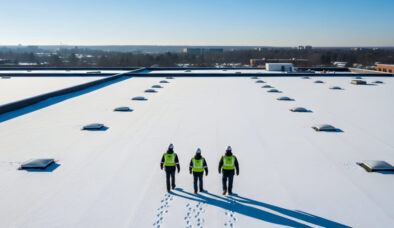Rewriting the Playbook: How CRE Professionals Really Build Relationships
Walk into any CRE conference and you’ll hear the same conversations echoing through the halls: cap rates, vacancy trends, and the latest PropTech innovations. These gatherings serve their purpose but ask any seasoned professional where their best deals originated, and they’ll probably point to somewhere completely different: a golf course, a charity 5K, or that company softball game where they finally got to know the contact they’d been trying to reach for months.
This is biz-sport networking, and it’s quietly revolutionizing how commercial real estate professionals build the relationships that drive their success. By mixing business with recreation, these events hit the mark in ways traditional networking rarely achieves: authentic connections that feel natural rather than forced.
Beyond the Scorecard
Here’s the thing about biz-sport events—nobody really cares who wins. Sure, there might be a trophy or some good-natured bragging rights, but that’s not why people show up. They come for what happens between holes, between sets, between miles.
“One thing I’ve always found is that sporting events and outdoor activities create a natural environment for authentic conversations,” said Kelly Mulkey, Senior Portfolio Manager with Lincoln Properties. “From a property management side of CRE—whether office, retail, or mixed-use—relationships are the foundation of everything we do. When you’re side by side on a golf course or at a charity run, the walls come down, and you get a better sense of the person behind the business card. Those shared experiences often turn into long-term partnerships that go far beyond what you can build in a conference room or office.”
Whether you’re commiserating over a missed putt, celebrating someone’s personal best time, or just enjoying the camaraderie of being outdoors together, you’re building the kind of connections that no amount of LinkedIn messaging can match.
Why Competition Creates Trust
You might wonder why relationship building over a round of golf feels so much more impactful than grabbing coffee. It turns out, there’s science behind why competition creates trust faster than almost any other shared activity.
When you face uncertainty together (will you make that putt? Can you finish this 5K?), your stress responses actually sync. Psychologists call this emotional synchrony, and it creates bonds that extend far beyond the activity itself. It’s why that handshake after a challenging round feels more meaningful than one exchanged in a lobby.
Think about it from a practical standpoint. When someone’s guard is down, maybe they’re laughing at their own terrible tennis serve or pushing through the last mile of a charity run, they’re more likely to be genuine. That authenticity becomes the driving force behind trust that makes future business conversations feel collaborative rather than adversarial.
For CRE professionals, this isn’t just interesting trivia. It’s an ace up your sleeve. Understanding that your brain is wired to build stronger connections through shared physical challenges helps explain why some of the industry’s biggest deals start with, “Remember when we played that scramble last spring?”
Reading Character Through Competition
Sports reveal character in ways that formal business interactions simply cannot. The pressure, the setbacks, and the small victories all strip away professional personas and show you who someone really is.
The reactions matter more than the results. How does someone handle a bad break? Do they encourage their teammates or focus only on their own performance? These moments provide insights that no resume or reference check can offer. In commercial real estate, where deals can take months to close and relationships span decades, understanding someone’s true character is invaluable.
Every Sport Tells a Different Story
Not all biz-sport networking events are created equal. Each sport creates its own unique relationship-building environment, and understanding these differences can help you choose events that align with your goals.
Golf remains the heavyweight champion for good reason. Four to five hours together creates unmatched opportunities for deep conversation. The individual nature of the game means you can have real one-on-one time even in a foursome, and the walking pace between shots naturally accommodates dialogue. Plus, golf’s built-in emphasis on integrity (calling penalties on yourself, respecting course etiquette) tees up immediate insights into someone’s character. When a potential partner takes a penalty stroke that nobody else saw, you’ve learned something valuable about their ethics.
Tennis events serve up something different. They’re all about energy and quick connections. The faster pace and shorter time commitment make them perfect for initial introductions or reconnecting with existing contacts. Doubles matches are particularly revealing because they showcase teamwork and communication styles in real-time. Want to know how someone handles pressure or adapts to changing circumstances? Watch them adjust their strategy mid-match.
Charity runs and cycling events level the playing field like nothing else. Physical appearance, age, and athletic ability become secondary to the shared goal of crossing the finish line. These events also tend to attract people motivated by causes beyond profit, which often reveals values and philanthropic interests that can become the foundation for worthwhile partnerships.
Team sports like softball leagues or charity basketball games are gold for observing leadership and collaboration styles in the field. Watching how someone coaches teammates, handles disagreements, or motivates others during a tough game gives you insights into their management potential.
The Vulnerability Advantage
Traditional business networking encourages us to present our best professional selves: polished, confident, and capable. Biz-sport networking does the opposite: it reveals our vulnerabilities, and paradoxically, this makes our business relationships stronger.
There’s something powerful about shared struggle. Whether it’s hitting into the rough on a golf course, struggling through the final miles of a charity run, or missing an easy shot in a tennis match, these moments of imperfection create winning connection points that polished conference room interactions never could.
“Sports strip away the formal titles and roles of the business world, creating an environment where you are simply a teammate,” said Blair Maynor, Property Manager with Cousins Properties. “It’s this shared passion and experience that provides the foundation for finding common ground and building genuine trust, resulting in authentic professional relationships.”
This productive vulnerability extends beyond individual moments. The informal nature of sporting events encourages people to share stories, admit challenges, and seek advice in ways they never would during formal business meetings. These authentic exchanges often become the foundation for mentoring relationships, partnerships, and long-term collaborations.
From Old-School Handshakes to New-School Networking
If you’ve been in commercial real estate for any length of time, you’ve probably heard the stories about how deals used to get done. Back when the industry was dominated by local family businesses and personal relationships, golf courses weren’t just where people networked, they were essentially outdoor boardrooms where handshake deals were the norm.
The exclusive nature of many golf clubs meant that access to the course often indicated membership in an elite business circle. Getting invited to play wasn’t just about recreation; it was about being accepted into a network of decision-makers. Major office developments, shopping centers, and industrial projects were conceived, negotiated, and agreed upon during 18 holes, with formal contracts simply confirming what had already been decided on the fairway.
This created the culture of “golf course deals” that became synonymous with CRE. Veterans would tell newcomers that their real education wouldn’t happen in the office but on the course, where they could observe how deals were actually made, and relationships were truly built.
But here’s what’s changed: today’s commercial real estate industry is more diverse, more regulated, and more global than ever before. While golf remains important, the modern networking landscape has expanded far beyond any single activity. The rise of co-ed sports leagues, charity events, and non-traditional activities has created a rich ecosystem of relationship-building opportunities, each offering unique advantages for different personality types and professional goals.
Modern CRE networking has also become more intentional and strategic. Where previous generations might have conducted business casually over a round of golf, today’s professionals approach biz-sport networking with clear objectives and measurable outcomes. The handshake deal hasn’t disappeared; it’s evolved into something more sophisticated and inclusive.
This evolution reflects broader changes in the industry itself. As technology has transformed how properties are marketed and transacted, the human element has become even more valuable. In an age of virtual tours and digital transactions, these authentic connections provide a competitive advantage that apps or platforms can’t replicate.
When Deals Get Personal
Some of commercial real estate’s most significant transactions have their origins not in boardrooms or formal presentations, but in the rapport formed during sporting events. While the specifics may remain confidential, the pattern is consistent: relationships built through shared experiences often lead to opportunities that purely transactional approaches cannot achieve.
The power of these connections lies in their foundation. When business discussions emerge from genuine relationships rather than cold outreach, the conversations feel different. There’s already trust, shared experience, and mutual respect in place. This doesn’t guarantee deal success, but it creates a collaborative rather than adversarial starting point.
The Long Game
Commercial real estate is ultimately a relationship business. While market knowledge, financial acumen, and technical expertise are essential, the ability to connect with people (clients, partners, vendors, even competitors) often determines long-term success.
The game may end when the final putt drops or the last runner crosses the finish line, but the connections formed and strengthened during those hours of shared experience can drive opportunities, partnerships, and success for years to come. In an industry where relationships often determine who gets the call when opportunities arise, that’s not just good networking—it’s good business.
Interested in learning about the state of play of the CRE industry? Read the full State of Play publication with this link.
Thank you to our State of Play Sponsors:






To stay up to date on news and resources such as this and other topics of importance to the real estate industry, subscribe to the free CRE Insight Journal Newsletter using this link.
Comments are closed.









